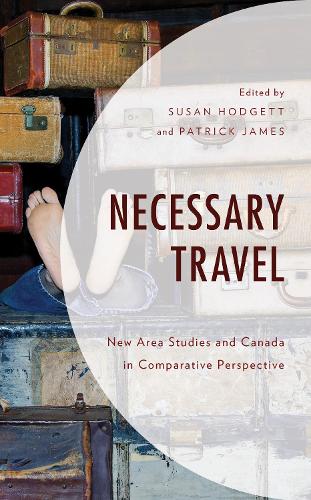
Necessary Travel: New Area Studies and Canada in Comparative Perspective
(Hardback)
Publishing Details
Necessary Travel: New Area Studies and Canada in Comparative Perspective
By (Author) Susan Hodgett
Edited by Patrick James
Contributions by Ibrahim A. I. Alfraih
Contributions by Abdelkarim Amengay
Contributions by Charles R. Batson
Contributions by Colin Coates
Contributions by Claude Denis
Contributions by Peter Gatrell
Contributions by Nicolas Albertoni Gomez
Contributions by Claus Bech Hansen
Bloomsbury Publishing PLC
Lexington Books
3rd December 2018
United States
Classifications
Professional and Scholarly
Non Fiction
Islam
Social and cultural anthropology
909
Physical Properties
Hardback
204
Width 162mm, Height 230mm, Spine 21mm
440g
Description
Recent, unpredictable incidents in diverse locations Paris, Nice, Ankara, Sinai, California, Manchester and London reinforce how governments and scholars must look beneath the surface for understanding of the turbulent post-9/11world. In particular, what does expertise mean in this new era This book answers that question The volume is about a particular kind of expert a type suffering from bad press for a long time namely, scholars who carry out area-based research. The term expert itself even comes in for some humor about how it might be defined someone who knows more and more, about less and less, until eventually they know everything about nothing. Behind the old joke is a grain of truth: Expert standing becomes unimpressive to us, in both intellectual and practical terms, when it is seen as parochial and lacking in vision. This volume will explore Area Studies (AS), a prominent type of expertise, along a range of dimensions. As we move towards the third decade in the new millennium, attention shifts to the somewhat unexpectedly positive future of New Area Studies (NAS) as a resurgent intellectual movement. NAS has departed from what the editors have dubbed Traditional Area Studies (TAS) commonplace till the millennium. Both the editors of this volume, and its contributors, are leading scholars in area-based work across continents. Together they have participated and observed as area-oriented research struggled to overcome protracted and intense criticism since the Cold War. Thus, the volume marks the resurgence of area-based research in its new guise as NAS the crux understanding increasing complexity around a shrinking globe. Taken together, the contents of this volume make the the case for a New Area Studies grounded in necessary travel, using new and wider methodologies involving reflective practice and production of knowledge with local people. It argues the necessity of such broad and deep approaches in order to appreciate what is going on in the world in the 21st century and to help us see off the arrival of more and increasingly nasty unpredictable shocks.
Reviews
The editors and contributors to this volume are critical of both conventional social scientific practice for its obvious failure to anticipate key developments in the contemporary world, and of traditional area studies research for its a-theoretical and descriptive qualities. Collectively, they advance a compelling case for a New Area Studies that embraces comparative and multiple disciplinary perspectives and that seeks to contextualize the impact of globalizing forces in particular places and cases. This timely and provocative volume deserves a wide readership across the social sciences and humanities. -- Munroe Eagles, SUNY Buffalo
Hodgett and James powerfully advocate for the development of New Area Studies (NAS) by demonstrating how productive a re-imagining of traditional area studies can and will be. After surveying critical regions around the world, the deeper dive into a much neglected region of area studies -- Canada -- offers both a salutary example of rethinking old models and a promise of what is to be gained in NAS. An interdisciplinary must-read for an academy in search of new models and modes of knowledge production and transmission. -- Milna Santoro, Georgetown University
By bringing together a first-rate team of contributors, this consistently stimulating collection gives new life to Area Studies by exploring links and tensions between the local and the global. -- Simon Dixon, University College London
Author Bio
Susan Hodgett is professor and director of area studies at the University of East Anglia, England. Patrick James is Dornsife Deans professor of international relations at the University of Southern California.
